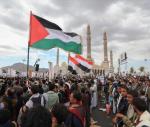You are here
The just Ukrainian struggle
Feb 24,2014 - Last updated at Feb 24,2014
The Ukrainian struggle for independence speaks to me on so many levels.
Because I know the history of the Ukraine, I understand its people’s resentment and fear of its often domineering Russian neighbour. I also understand Ukrainians’ deep attachment to their land, their culture and their story.
Ukrainians have been forced to endure many bitter hardships in the last century. They were occupied by foreign powers, their lands were divided and exploited, the people were ruthlessly subjugated and, during one especially cruel period, they were subject to genocide by Soviet leader Josef Stalin.
With the fall of the Iron Curtain, Ukrainians came out from under the Soviet domination hoping for a future that would be defined by unity, sovereignty and freedom. But with the economy still under Russia’s yoke, independence is not easy for Ukraine.
It was precisely this desire to see their nation freed from Russian hegemony that brought the Ukrainians to seek deeper economic ties with Europe.
Afraid of losing his connection to his “satellite”, Russian President Vladimir Putin bullied and bribed the Ukrainian leadership into backing away from seeking stronger relations with Europe, instead forcing it to choose to enter a “customs union” with Russia.
In response to their government’s surrender to Russia, Ukrainians exploded in protest, with hundreds of thousands gathering in the Maidan — a square in Kiev.
Their demonstrations have been massive, non-violent and sustained.
In an effort to try to keep the government in line, the Russians alternated between using threats and bully tactics, and offering strong financial incentives.
The Ukrainian government intensified repression of protesters and ratcheted up the use of force, culminating early this week in the killing of scores of demonstrators.
International and domestic outrage was immediate and harsh. As the Ukrainian president became increasingly isolated and began losing political support — even from members of his own party — he relented, offering to back away from Russia, surrender some of his powers, and call for new elections.
The story is clearly not over. Having weathered the harsh winter, the young demonstrators in Maidan do not trust their government and are not ready to go home until they see results.
The government has changed its position so many times in the past, it may do so again. That may be one reason why the protesters have stayed in place.
But as unsettled as the situation remains, I can only imagine the elation of older Ukrainians as they see young people defying and appearing to succeed in defeating the plans that Putin’s Russia had for their country.
Having been subjugated for so long, this victory, though incomplete and uncertain, must feel great. (I was delighted to hear that last month, in the midst of the protests, thousands of Ukrainian demonstrators in Maidan watched and cheered “The Square”, the Oscar-nominated film about the demonstrations in Tahrir Square that was conceived and directed by Jehane Noujaim.)
I am not only following this dramatic story as it unfolds in the media, I am living it through the eyes of my Ukrainian American friends.
Like my generation of Lebanese Americans, they were born American of immigrant parents. They grew up hearing stories of the homeland, and throughout the Soviet domination of Ukraine, they wanted nothing more than to see freedom flourish in their parents’ country.
Like all children of immigrants, they struggled with issues of identity and faithfulness, such as how to become American while maintaining pride in their heritage.
Their parents and their church created institutions that kept them close to their Ukrainian culture and community. And they joined organisations that gave voice to their concerns, as Americans and as US citizens of Ukrainian descent.
I’ve been to Ukrainian American events and meetings. It is a committed community.
I recall the pride they felt when they were able to get the Democratic National Committee and then President Barack Obama to issue statements condemning and commemorating the Holodomar — the Soviet-imposed genocidal starvation of Ukrainians in the 1930s.
I have seen them, throughout the events of the past several months, lobby, educate and lend their expertise to the cause of a free Ukraine. They want the land of their parents and grandparents to be out from under the Russian heel.
The Ukrainian people deserve our support because the values they speak of are fundamental and the story they are telling is compelling.
This is a struggle that they must win simply because it is right.












